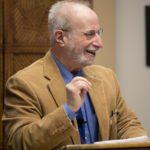By Dr. Joseph Chuman
 We are inundated by a spate of books and a tsunami of articles, popular and learned, issuing their warnings about the decline of democracy in America. I don’t think their writers are jockeying for headlines or pandering to sensationalism. They are on to something. From the stagnation of Congress to the power of big money, from the tribalization of political views to a loss of enchantment in democratic values, I do think our democracy is being severely challenged. History tells us that democracies do rise and fall, and there is no guarantee that American democracy will survive forever. In the final analysis, democracy is as democracy does.
We are inundated by a spate of books and a tsunami of articles, popular and learned, issuing their warnings about the decline of democracy in America. I don’t think their writers are jockeying for headlines or pandering to sensationalism. They are on to something. From the stagnation of Congress to the power of big money, from the tribalization of political views to a loss of enchantment in democratic values, I do think our democracy is being severely challenged. History tells us that democracies do rise and fall, and there is no guarantee that American democracy will survive forever. In the final analysis, democracy is as democracy does.
I think that Ethical Culture has something important to say in these challenging times. While Ethical Culture has always been a numerically small movement, in my view the values that Ethical Culture stands for and puts into practice serve as an inspirational model of what a vibrant democratic lifestyle, both nationally and in the local arenas of life, can look like.
The heart of democratic living is an engagement in the affairs of the wider world and a commitment to reciprocity in human relations. When one looks at the seminal ideas that our founder, Felix Adler, brought to Ethical Culture, we see a template for democratic organization.
Adler was fascinated by the relation of what we may call the “one and the many.” For Adler, we are all unique individuals. But we are not individuals alone, nor do we individually stand against society. Citizenship is not a zero sum game. Rather, we are organically linked to a vast human web, a human family. And so, when we interact with others we change them and society as a whole, and because we are so linked, we ourselves are changed.
In this understanding, democracy is far more than merely casting a vote every four years. Democracy is, rather, the lifestyle of a free people. It is dynamic commitment that engages the person not only in issues of national moment, but in the smaller arenas of life, in what has come to be known as “civil society.” I fulfill democratic ideals when I work to improve my local school, when I involve myself in a local environmental clean-up, when I help to organize a labor union, or demonstrate for racial justice. In each case, I strive to improve my community and the lives of the people in it, and in the process, I enrich my own life as well.
This process entails living a life of commitments that reach beyond immediate self-interest. It involves realization of the social nature that is inherent in us. It involves inspiration. It is in this role that Ethical Culture also finds a place.
I plan to expand on these ideas in my address of Nov. 4, entitled “Ethical Culture and the Vitalization of American Democracy.” I hope that you can join me.
Dr. Joseph Chuman is leader of the Ethical Culture Society of Bergen.


